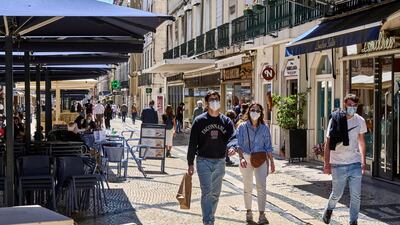The World Health Organisation has backed England's traffic light system for the return of international travel.
Dr David Nabarro, WHO's special Covid-19 envoy, said governments could no longer continue to "mothball" sections of the economy as it was time to "get on with life" even if the threat of the virus remained.
He said he was “impressed by the care with which the British government is trying to work out the safe places to go to” after the green, amber and red sets of countries were revealed last week.
“The virus is changing, it’s mutating all the time, and we know new variants are emerging and these are capable of being transmitted more easily,” he said.
“But we've got to get on with life and we can’t go on mothballing ourselves forever, so finding a way to restart despite this fear is what we all have to do. We must maintain a very vigilant posture in the coming months.”
A dozen countries and territories were included in the green light category, allowing for relatively free travel, but most were categorised as amber, meaning travellers have to quarantine at home for 10 days on arrival and take PCR Covid-19 tests on days two and eight.
Red-list status means that only UK or Irish residents can enter the country and returnees face a mandatory hotel quarantine stay costing £1,750 ($2,447).
Britain is using an algorithm to calculate countries' listings. After the system comes into effect on May 17, it will be reviewed every three weeks with the next announcements expected on May 28.
Transport Secretary Grant Shapps said the UK wanted to “start looking outward again” as he announced the “first steps” to the return of travel on a broader scale.
“We want a summer in which, with the help of vaccines and testing, we can reunite families and friends and travel to places we love,” he said.
The traffic light system is due to come into force on May 17 under the current plans to ease lockdown restrictions.
On Tuesday, the EU will discuss plans for easing restrictions for fully vaccinated travellers. Currently, unrestricted travel to the continent is only permitted from seven countries.
Travel also remains limited in many parts of the world. The US largely prohibits non-essential travel, while countries such as Australia and New Zealand – both on the UK’s green list – ban non-citizens from entering.
Dr Nabarro said the world needed to “be on the defensive” as further countries look to open up again.
“There is no security with this virus,” he said.
“It is constantly capable of changing and as it changes, it has the ability to evade the protection that’s been given to us by these wonderful vaccines. We deal with that when it comes, we deal with it by being alert.”
More on travel
England sets out traffic light system in bid to revive foreign travel
Green list flights offer hope to Covid-ravaged UK travel industry













